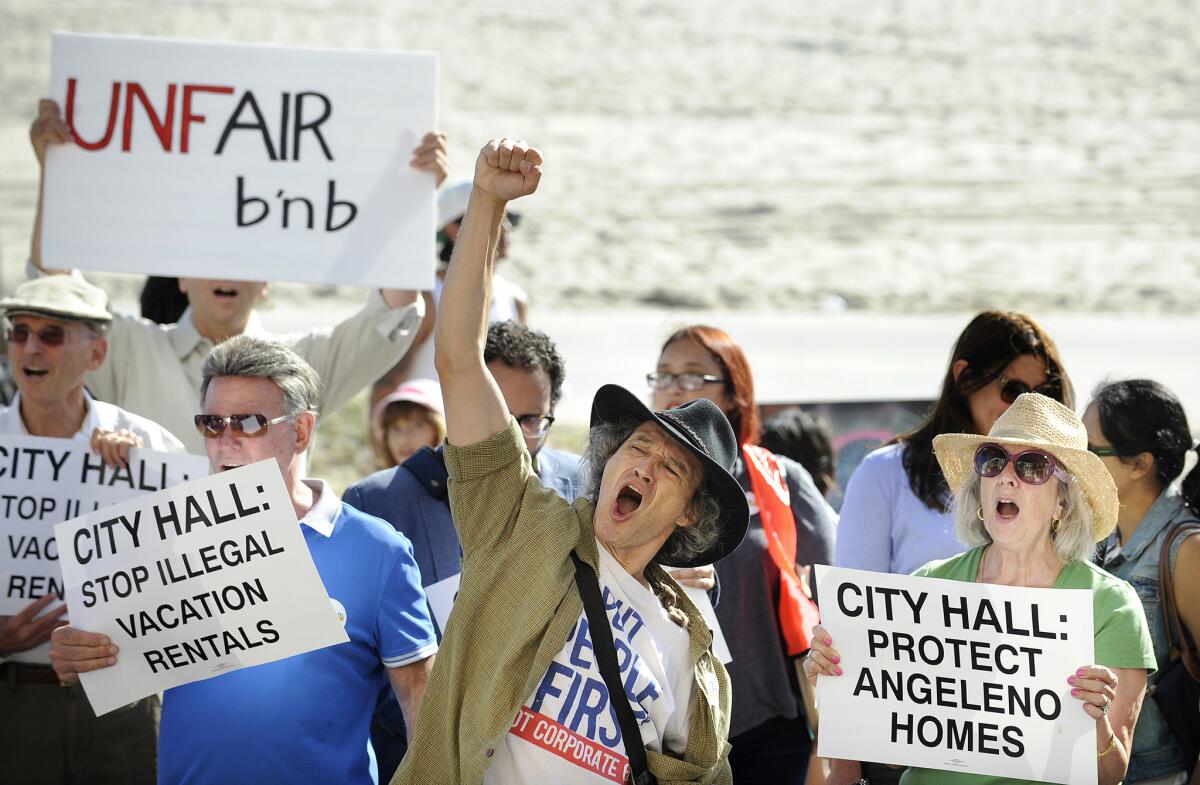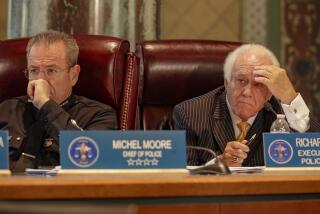L.A. officials want to keep Airbnb-type rentals from being ‘rogue hotels’

Dozens of Venice residents and affordable housing supporters hold a rally to call on the Los Angeles City Council to regulate short-term rentals and protect affordable housing in Venice.
Worried about needed housing being turned into “rogue hotels” through online platforms such as Airbnb, Los Angeles lawmakers are weighing whether to bar people from renting out homes for short stays that are not their main residence.
As Los Angeles officials begin the process of hashing out new rental regulations, they are trying to draw a line between what one local lawmaker calls “good” and “bad” rentals -- a line that is hotly disputed by affordable housing advocates, rental operators and neighborhood activists.
Under existing city rules, renting out homes or apartments for fewer than 30 days at a time is illegal in big swaths of Los Angeles, according to the planning department.
But the practice has nonetheless flourished with the popularity of Airbnb and similar platforms that connect hosts to travelers looking for a place to stay for a few days. And that has stirred up a sharp debate in local neighborhoods and at City Hall.
Scores of people packed a Tuesday hearing on how Los Angeles should regulate the short-term rental industry, launching a pitched debate over rules being proposed by city lawmakers. Members of the City Council’s Planning and Land Use Management committee stressed that it was merely the beginning of the process of deciding how to regulate such rentals.
Airbnb and an alliance of local hosts say renting out rooms or whole homes for short stays has bolstered the local economy and provided vital income to ordinary Angelenos. At the Tuesday hearing, many local hosts said rentals helped them pay for mortgages or student loans and opened their lives to travelers from across the world.
“I am no longer lonely,” said Rita Harris, a 75-year-old Airbnb host who recently hosted a neuroscientist from Italy and a plastic surgeon from Singapore. “I have money in my pocket and a skip in my step.... I pay taxes and help the local economy.”
Housing advocates, the hotel workers union and some neighborhood activists counter that the phenomenon has disrupted neighborhoods and taken sorely needed housing off the market. Anne Bagasao complained that her 90-year-old mother couldn’t get the city to stop noisy parties at the home being rented out next door in Angeleno Heights.
“Save our neighborhoods from becoming party villages for out-of-towners,” she said.
Yet there appears to be some common ground: Even some of the sharpest critics of Airbnb say they see little wrong with someone renting out a spare room or back house from time to time, part of what Councilman Mike Bonin dubbed “good short-term rentals.”
Instead, the fiercest debate has erupted over what Bonin considers to be “bad short term rentals” -- companies transforming entire homes or apartment buildings into nonstop rentals for a revolving door of tourists, creating what he calls “de facto hotels.”
“If we are going to get serious about our affordable housing crisis in Los Angeles, we need to crack down on this aspect of the bad short-term rentals.... If thousands of rental units are no longer on the market, it is jacking up rents here in Los Angeles,” Bonin said Tuesday.
The Los Angeles Alliance for a New Economy, an advocacy group allied with labor unions, says such “commercial” rentals make up a growing share of Airbnb listings and the bulk of its L.A. revenue. It estimates short-term rentals have removed nearly 11,000 L.A. units from the housing market, based on a recent analysis of listings on Airbnb and other rental websites.
Airbnb spokesman Christopher Nulty called that number “inaccurate and misleading,” arguing that the alliance’s analysis incorrectly assumes any whole unit on Airbnb is permanently off the housing market. Most “entire home listings” are rented fewer than 90 days a year, Nulty said.
Nulty added that Airbnb welcomes the opportunity to help create “sensible rules,” but said Los Angeles long has had housing issues that shouldn’t be blamed on Airbnb hosts.
SIGN UP for the free California Inc. business newsletter >>
Still, amid a string of street protests, the online platform has quietly stripped some rental listings from commercial operators off its website.
Bonin argues that his proposed rules, also backed by Council President Herb Wesson and Councilman Paul Koretz, draw a sensible line between the “good” and “bad” rentals. His plan would also bar such rentals at rent-controlled units and require them to collect the same kind of city taxes as hotels, which is already legally required but inconsistently done.
So far, Airbnb has cautiously welcomed the proposal, which would bar some rentals but broadly legalize the practice of Angelenos renting out their own primary homes or spare rooms.
But some Los Angeles rental hosts have balked at the idea, arguing that barring people from renting out even a second home would be a form of government overreach. Many are members of the Los Angeles Short Term Rental Alliance, a group that advocates for rental operators and owners.
“If somebody owns a single-family home, they should be able to rent that home as they please,” Lingling Martin wrote to lawmakers, saying she relied on rental income from a second home she owns near the beach.
LAANE and other Airbnb critics say they also see the proposal floated by Bonin as a good start. But some argue Los Angeles needs to beef up enforcement before it passes any new regulations, pointing out that few short-term rentals have faced any city action even though planning officials say they are currently barred in much of L.A.
Even considering new rules is “unrealistic” unless the city hires more people to “investigate and prosecute those who will willingly ignore any future ... regulations just as they currently ignore zoning ordinances,” Silver Lake resident Anne-Marie Johnson wrote to lawmakers.
Judith Goldman, a cofounder of the Keep Neighborhoods First coalition that opposes “abuse” of short-term rentals, said the city must demand more transparency from platforms such as Airbnb in order to enforce any rules. Activists say a lack of key information about where and how rentals are happening has made it harder to enforce the rules in L.A. and elsewhere.
Airbnb has resisted turning over user information such as host names and addresses elsewhere, arguing it is an invasion of privacy. In the face of complaints about L.A.’s existing enforcement, Airbnb regional head of public policy David Owen argues that the current city rules are so unclear that they have hampered city efforts to stop bad actors.
If Los Angeles adopts “clear, fair rules,” Owen said, “that step will go a long way to clarifying for everybody how to enforce the law.”
City officials now plan to hold hearings across Los Angeles about the issue. Bonin, who is not on the planning committee that held the Tuesday hearing, said he hoped city officials would be able to draft possible regulations by October.
Follow @latimesemily for what’s happening at Los Angeles City Hall
MORE ON AIRBNB IN L.A.:
Airbnb cuts ties with vacation-rental firms in Los Angeles
New soldiers in Airbnb battle: PR and politics
At Airbnb, growth brings scrutiny, regulation
More to Read
Sign up for Essential California
The most important California stories and recommendations in your inbox every morning.
You may occasionally receive promotional content from the Los Angeles Times.











